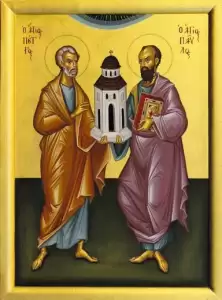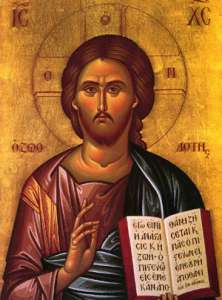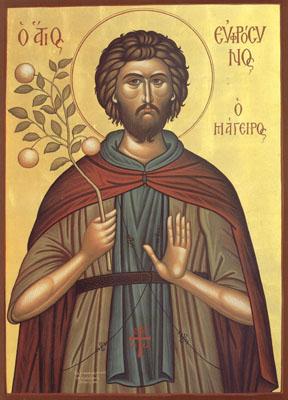Warning: Undefined array key "margin_above" in /home/stscahvallejo/public_html/wp-content/plugins/ultimate-social-media-icons/libs/controllers/sfsiocns_OnPosts.php on line 652
Warning: Undefined array key "margin_below" in /home/stscahvallejo/public_html/wp-content/plugins/ultimate-social-media-icons/libs/controllers/sfsiocns_OnPosts.php on line 653
Enemies of the cross of Christ (Philippians 3:18) are those who oppose the cross of Christ. How? The cross of Christ teaches us to walk a narrow path, and they walk a wide path. The cross teaches humility and they are proud. The cross teaches you to cut off your whims, and they do them. The cross teaches to be patient but they are angry and hateful. The cross teaches to crucify the flesh with passions and lusts (see Gal. 5: 24), and they are wise in the flesh. The cross teaches to die to sin and to live for God, and they live for themselves and sin. The cross teaches them to seek things from heaven; they think about earthly things.
-St. Tikhon of Zadonsk
The Cross is for Christians
by Fr. Ninos Oshaana
September, 2022
For Sunday, September 11
This coming week, we will celebrate the feast of the Elevation of the Holy Cross (Sept. 14). This feast is special to our parish as it marks the event when St. Helen found the actual Cross on which our Lord was crucified in the year 325 AD. In the icon above, she is standing next to her son, St. Constantine, as she gestures with her hand towards the central image of the icon: St. Macarius of Jerusalem holding up the Cross with both hands above his head. Behind him are deacons and assembled nearby are the faithful who gaze upon the Cross with love and adoration. The feast also commemorates another historical event. In the year 614, the Persians plundered the Holy Land and took the Cross to their own country. The Roman Emperor Heraclius then set out on a military campaign against the Persians to retrieve the Cross and restore it to its rightful place.
Why is this feast important for us? The Cross is not merely a piece of jewelry we wear around our necks. It is not a talisman or a magical wand. It is not merely a sign by which Christianity is recognized. Rather, it is a key that opens the door to another life, another way and the only truth. What is this life, way and truth? Christ said, “I am the way, the truth, and the life. No one comes to the Father except through Me. (John 14:6)
In other words, we don't merely follow the teachings of Christ as if he was just a religious philosopher. He didn't say, I will show you the way, the truth and the life. He said, "I am the way, the truth and the life." We are therefore unable to receive this way, truth and life unless we also receive Christ into our hearts and allow him to live and act within us.
How does this happen? Through the Cross. The Cross and its suffering must also become our own personal reality. It must become our Cross if we want His resurrection and eternal life to be ours as well. In this way, we truly actualize our union with Christ that occurred at our baptism when we died with him in the baptismal waters and then were raised with him when we came out of the water.
To be an actual Christian means first and foremost to have a heart that suffers pain for those who are suffering in the world and to do something about it, as Christ did. It means to be radically counter-cultural and deny the world and the pleasures of life by crucifying my flesh and purifying my heart and mind through confession, fasting, prayer, abstinence, prostrations, kneeling, and receiving Holy Communion regularly, as Christ commanded.
And all this is done not because I'm seeking a reward but because my heart is wounded by the love of Christ who showed me how much he loved me through his suffering on the Cross, his death, his resurrection and through his ascension by which he elevated my human nature to heaven and invites me to join Him there.
Wounded by his love and self-denial for me, I desire to give Him my own self-denial and suffering as an act of love, by alleviating the suffering of others who are made in His image and whom He loves, and so encounter Him, reflect Him, and unite with Him through love for his creation.
True Christianity is not for the faint of heart or for those who seek a life of constant comfort and pleasure on earth but rather it requires the crucifixion of our distorted self-love, ego, pride, greed, anger, gluttony, lust, envy and all the passions within us. It requires a different understanding of the purpose of life than that which the world promotes.
To be like the crucified Christ means I understand that my life is not meant for me only but rather as an opportunity to serve others. By living my life as a servant of Christ and His Church, I gain life and Christ for eternity. But by living my life selfishly, I show myself unworthy of both it and Christ. This sobering truth is expressed by Christ himself:
Then Jesus told his disciples, “If anyone would come after me, let him deny himself and take up his cross and follow me. For whoever would save his life will lose it, but whoever loses his life for my sake will find it. For what will it profit a man if he gains the whole world and forfeits his soul? Or what shall a man give in return for his soul? (Matthew 16:24-26)
Let us be disciples of Christ; a people of the Cross. Because without the cross there is no resurrection and without loving and serving others there is no true life or living, in this world or the one to come.
 Epistle Reading
Epistle Reading
The reading is from St. Paul's Letter to the Galatians 6:11-18
Brethren, see with what large letters I am writing to you with my own hand. It is those who want to make a good showing in the flesh that would compel you to be circumcised, and only in order that they may not be persecuted for the cross of Christ. For even those who receive circumcision do not themselves keep the law, but they desire to have you circumcised that they may glory in your flesh. But far be it from me to glory except in the cross of our Lord Jesus Christ, by which the world has been crucified to me, and I to the world. For neither circumcision counts for anything, nor uncircumcision, but a new creation. Peace and mercy be upon all who walk by this rule, upon the Israel of God. Henceforth let no man trouble me; for I bear on my body the marks of Jesus. The grace of our Lord Jesus Christ be with your spirit, brethren. Amen.
St. Paul is writing this letter to the church in Galatia. The church in this region was struggling with internal conflicts regarding certain Jewish traditions such as circumcision, ritual baths, laws of purification, etc. that were causing division between the Christians who were ethnic Jews and had practiced them for centuries and the Gentiles (non-Jews) who had not inherited these practices and didn't want to follow them. St. Paul teaches them that with Christ a new spiritual law of love and grace has come that fulfills the old laws and traditions. Following Christ, even if it means persecution, is the true calling for a Christian, and not the blind observance of rituals that are followed simply for their own sake. St. Paul himself suffered greatly for preaching the gospel, enduring beatings, hunger, thirst, abandonment, betrayal, shipwreck, imprisonment and ultimately martyrdom.
As Orthodox Christians, we have to be careful not to fall into this same mentality of following rituals and traditions for their own sake while our hearts are far from God. For example, saying our prayers, venerating icons, fasting, alms-giving, receiving the sacraments, lighting candles, making koliva, making prosfora, and all these wonderful practices are of no use to us if we do not have repentance and love for Christ and others.
Questions:
- What rituals, practices or tradition of our Orthodox Faith do you love the most and why?
- What does St. Paul mean when he says, "I bear on my body the marks of Jesus"?
 Gospel Reading
Gospel Reading
Sunday before Holy Cross
The Gospel According to John 3:13-17
The Lord said, "No one has ascended into heaven but he who descended from heaven, the Son of man who is in heaven. And as Moses lifted up the serpent in the wilderness, so must the Son of man be lifted up, that whoever believes in him may have eternal life.
"For God so loved the world that he gave his only Son, that whoever believes in him should not perish but have eternal life. For God sent the Son into the world, not to condemn the world, but that the world might be saved through him."
In this Sunday's gospel reading we hear the reason why Christ came and died for us. It was for the same reason why he created us. Because of love. And love requires absolute commitment and total devotion, no matter what. Otherwise it is not true love. Such commitment and devotion was shown by Christ for us in the greatest possible way through his painful death on the cross. There is no greater expression of love than to die for someone else.
Most of us have experienced this kind of unconditional love from our parents, family, and friends. We may feel and express this kind of love towards others. But the love that God has for us is still infinitely greater. In fact, St. John tells us that God is love. Love is an energy of God. Therefore the love we feel towards one another is actually God's love flowing through us. Too often we forget this and fail to recognize it and thank Him for the blessing of experiencing love in this life; the wonderful gift of experiencing God's care for us through the love we receive from others and the love we give to others.
Questions:
- What are some ways you have experienced God's love recently?
- What do you think keeps us from loving the way God loves?
- What does God want from us in return for his love?
![]() Today Salvation has come
Today Salvation has come
After we sing the hymn of the Great Doxology, we sing another hymn titled "Today Salvation has come." But why do we say "today" if Christ came to save us two thousand years ago? It has to do not with when we were saved by how we are saved. As Orthodox Christians, we believe that we were saved when Christ died on the Cross. We are being saved today through our struggle in repentance and the divine grace we receive through the Holy Sacraments. And, we will be saved at the Second Coming of Christ at the end of the world. Since Christ rose on Sunday, every Sunday is Pascha, a celebration of Christ's victory over sin and death. His victory is our victory, if we claim it for ourselves by living our lives in a manner that is worthy of the salvation we have received from Christ.
This week, let's listen and learn what we just discussed above: the hymn "Today Salvation has come"
- Click the button below to download the sheet music.
- View or print out the sheet music.
- Click Track 2 - Today Salvation has come below to listen to it chanted. Try to learn it and sing-along!
 Saint Euphrosynus the Cook
Saint Euphrosynus the Cook
Little is known of the life of Euphrosynus other than he was born of simple parents. He was a humble monastic whose desire was for anonymity. He is known for one incident in his life.
As Euphrosynus fulfilled his monastic obedience in the kitchen as a cook for the brethren of the monastery, he did not absent himself from thought about God. He continually dwelt in prayer and fasting, remembering always that obedience is the first duty of a monk. Therefore, he was obedient to the elder brethren. His patience was amazing. The brethren often reproached him, but he did not complain and endured every unpleasantness. St. Euphrosynus pleased the Lord by his inner virtue that he concealed from people, the spiritual heights of which their unassuming fellow-monk the Lord Himself revealed to the monastic brethren.
A priest of the monastery in praying asked the Lord to show him the blessings prepared for the righteous in the age to come. In a dream it seemed to the priest that he was standing in a garden. Of the scene, he contemplated its inexplicable beauty with fear and with joy.
In it he also saw Euphrosynus, the cook of his monastery. Amazed at this encounter, the presbyter asked Euphrosynus how he came to be there. The saint replied that he was in Paradise through the great mercy of God. The priest then asked if Euphrosynus would be able to give him something from the surrounding beauty. In reply, St. Euphrosynus suggested the priest take whatever he wished, and so the priest pointed to three luscious apples growing in the garden of Paradise. Euphrosynus picked the three apples, wrapped them in a kerchief and gave them to his companion.
When the priest awoke in the early morning, he initially thought the vision a dream, but suddenly he noticed next to him the cloth with the fruit of Paradise wrapped in it, emitting a wondrous fragrance. Later, the priest found St. Euphrosynus in church and asked him under oath where he was the night before. He replied that he was where the priest also was. Then, the monk continued that the Lord, in fulfilling the prayer of the priest, had shown him Paradise and had bestowed the fruit of Paradise through him, " the lowly and unworthy servant of God, Euphrosynus."
Then, in an assembly of the monastery brethren, the priest related everything he had experienced, pointing out the spiritual heights of Euphrosynus in pleasing God and to the fragrant fruit of Paradise. Deeply impressed by what they heard, the monks went to the kitchen to pay respect to St. Euphrosynus. But, they did not find him there. Fleeing human glory, Euphrosynus had fled the monastery. The place where he concealed himself remained unknown, but the monks always remembered that their monastic brother St. Euphrosynus had come upon Paradise, and that they, in being saved through the mercy of God, would meet him there. The pieces of the apples from Paradise, the brethren reverently kept and distributed for blessing and for healing.
We commemorate Saint Euphrosynus the Cook on September 11. Through the intercession of Saint Euphrosynus, O Lord Jesus Christ our God have mercy on us and save us. Amen.
In Saint Euphrosynus, we see an amazing example of humility and also how God blesses and rewards even in this life those who attain it. Every person has their own life and its circumstances through which humility can be practiced. For Saint Euphrosynus it was as a cook in a monastery. For us, it will be in some other way. However, too often our pride can keep us from recognizing these opportunities to practice humility and thereby grow in this virtue. And humility is considered "the mother of all virtues." In other words, he or she who achieves humility, easily acquires all the other virtues as well.
There are also some ways we may misunderstand what humility is. Humility does not mean being degraded. It does not mean appearing humble by our external behavior. It does not mean self-hate or considering ourselves to be a terrible, vile, disgusting person.
True humility means to be simple, without deceit, completely transparent, honest and without pretension. It means to be willing to serve anyone, including the least of God's creatures. It means to not think anything to be beneath my dignity and honor. Ultimately, humility is to see myself and all my sins and everything in me as I truly am: that without the grace and compassion of God, I am nothing but dust and ashes, consigned to death. There is a profound freedom and power in achieving such humility. Saint Isaak of Nineveh said that the one who can see his own sins is greater than the one who can raise the dead.
The icon of Saint Euphrosynus can often be found hanging in the kitchen of an Orthodox home. It reminds us of how he served others with love and attained humility through his devotion and obedience in the simple and everyday task of cooking. What are the opportunities God is giving you today to attain humility?
Saint Euphrosynus is commemorated on September 11. Through the intercessions of St. Euphrosynus the Cook, O Christ our God, have mercy on us and save us. Amen.
Thank you for participating in SOFIA! Look for an email notification next week when a new lesson page is posted. See you Sunday!

 Weekly catechism and spiritual devotion for the Orthodox home
Weekly catechism and spiritual devotion for the Orthodox home